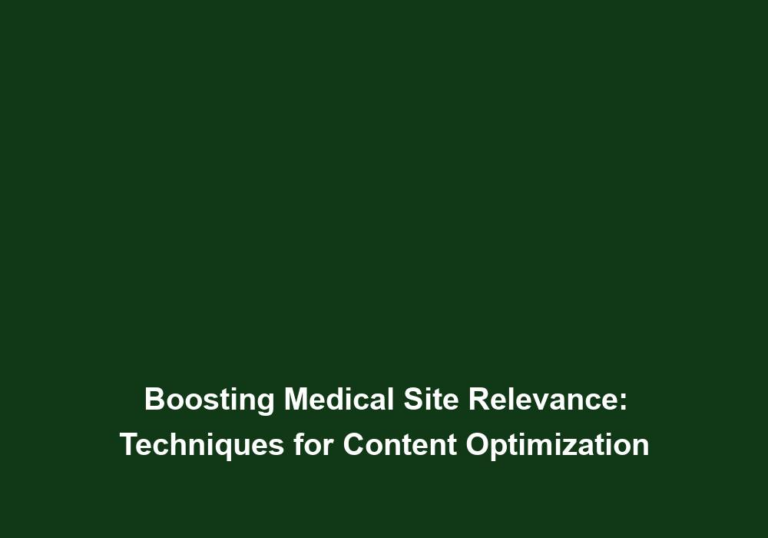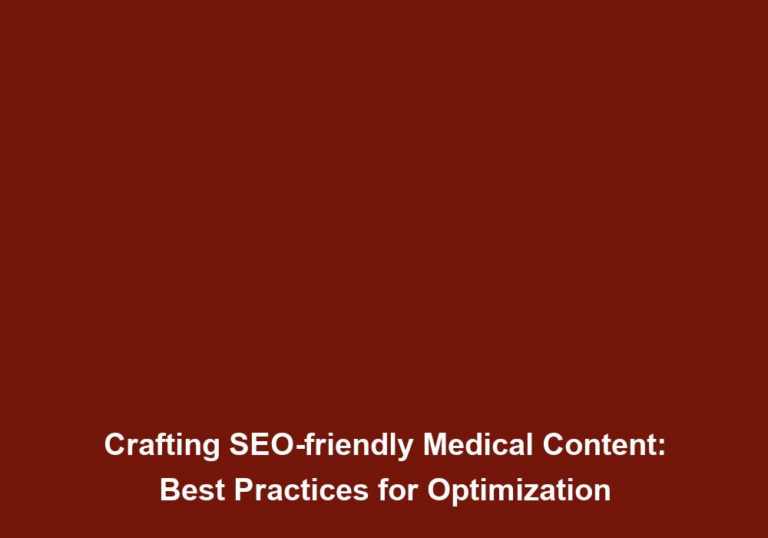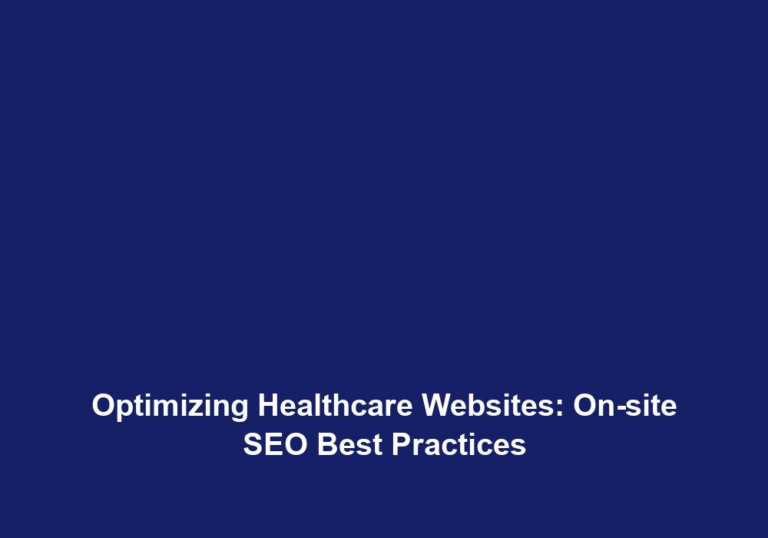Identifying High-Value Search Terms: Healthcare Keyword Research Strategies
Keyword research plays a crucial role in the success of any Search Engine Optimization (SEO) strategy, especially in the healthcare industry. By understanding and targeting high-value search terms, healthcare websites can significantly enhance their visibility and attract organic traffic. In this article, we will explore effective strategies to identify and leverage high-value search terms for healthcare websites.
Importance of High-Value Search Terms in Healthcare
In the competitive healthcare landscape, it is essential to rank well in search engine results in order to attract potential patients, increase brand visibility, and establish authority. High-value search terms, also known as keywords, are the queries that users enter into search engines while looking for specific information, products, or services.
By identifying and optimizing for these high-value search terms, healthcare websites can improve their search engine rankings and attract targeted organic traffic. Moreover, targeting relevant keywords allows healthcare providers to reach their intended audience and provide them with valuable content that meets their needs.
Effective Strategies for Identifying High-Value Search Terms
- Understanding Your Target Audience: To identify high-value search terms, it is crucial to gain a deep understanding of your target audience. Determine the demographics, preferences, and needs of your potential patients. This knowledge will help you tailor your keyword research to meet their specific requirements.
- Conduct surveys or interviews with your existing patients to gather insights about their search habits and the keywords they use.
- Analyze social media conversations and online forums related to healthcare to understand the language and terms used by your target audience.
- Use tools like Google Analytics to gather demographic data about your website visitors and identify patterns in their search behavior.
- Brainstorming and Expanding Keyword Ideas: Start by brainstorming a list of general keywords related to your healthcare niche. Consider the services you offer, medical conditions, treatments, and any unique aspects of your practice.
- Use online tools like Google Trends, Google Keyword Planner, and SEMrush to expand your initial list and find related keywords.
- Look for variations of your primary keywords by adding prefixes, suffixes, or synonyms.
- Consider the questions your target audience might ask and incorporate those into your keyword research.
- Competitor Analysis: Analyzing the websites of your competitors within the healthcare industry can provide valuable insights and help you discover new keyword opportunities.
- Identify the keywords your competitors are targeting and ranking well for by using tools like SEMrush or Ahrefs.
- Analyze their content strategy and identify any gaps that you can fill with your own content.
- Look for opportunities to create unique and valuable content that sets you apart from your competitors.
- Long-Tail Keywords: Long-tail keywords are more specific keyword phrases that typically contain three or more words. While they may have lower search volumes, they offer higher conversion potential as they reflect the specific needs and intent of users.
- Incorporate long-tail keywords into your content strategy to attract highly targeted traffic.
- Use tools like Answer the Public or Keywordtool.io to find long-tail keywords relevant to your healthcare niche.
- Consider using long-tail keywords in your blog articles, FAQs, and landing pages to address specific user queries.
- Location-Specific Keywords: If you operate a local healthcare practice, focusing on including location-specific keywords in your content can help you rank higher in local search results.
- Identify the specific locations you serve and incorporate relevant keywords into your content, such as “dentist in NYC” or “NYC dental clinic”.
- Optimize your Google My Business listing with accurate location information and keywords.
- Encourage satisfied local patients to leave positive reviews mentioning your location and services.
- Volume and Competition Analysis: While it is important to target high-volume keywords, it is equally vital to consider the competition for those keywords.
- Use tools like Moz or Ahrefs to analyze the search volume and competition level of specific keywords.
- Aim for a balance between high search volume and manageable competition to maximize your chances of ranking well.
- Consider targeting long-tail keywords with lower competition to increase your chances of ranking higher in search results.
- User Intent Analysis: Understanding the intent behind user searches is crucial for effective keyword targeting.
- Determine whether users are looking for information, seeking specific services, or ready to make a purchase.
- Optimize your content to align with user intent, addressing their needs and providing valuable solutions.
- Use tools like Google Search Console to analyze the click-through rates and engagement metrics of your content, which can indicate whether your content is meeting user intent.
- Content Gap Analysis: Performing a content gap analysis can help you identify topics and keywords that your competitors are targeting but you haven’t covered yet.
- Analyze the content of your competitors and identify any gaps in your own content strategy.
- Look for keyword opportunities that your competitors may have missed.
- Create content that fills the gaps in the market and addresses the needs of your target audience.
- Monitoring and Refining: Keyword research is an ongoing process. Regularly monitor the performance of your chosen keywords and make necessary adjustments.
- Use tools like Google Analytics or SEMrush to track the rankings and organic traffic of your targeted keywords.
- Keep an eye on emerging trends and evolving user behavior to stay ahead of the competition.
- Continuously refine your keyword strategy based on performance data and user feedback.
Implementing High-Value Search Terms into Your Content Strategy
Once you have identified the high-value search terms relevant to your healthcare website, it’s time to incorporate them into your content strategy. Here are a few tips to effectively optimize your content for targeted keywords:
-
On-Page Optimization: Strategically place your target keywords in your page titles, meta descriptions, headings, and throughout the body of your content. However, avoid keyword stuffing as it can have a negative impact on your website’s rankings.
-
Creating Valuable and Engaging Content: Develop high-quality content that is informative, engaging, and tailored to the needs of your target audience. Incorporate the identified high-value search terms naturally within the content, providing valuable information and addressing user intent.
-
Internal and External Linking: Utilize internal linking by linking relevant pages within your website to enhance user experience and improve SEO. Additionally, incorporate external links to reputable sources to provide additional value to your audience and improve your website’s credibility.
-
Optimizing Images and Multimedia: Optimize images and multimedia elements on your website by including relevant keywords in image alt tags and captions. This can improve your website’s visibility in image search results and provide an additional avenue for organic traffic.
Conclusion
In conclusion, identifying high-value search terms is a critical aspect of healthcare SEO. By understanding your target audience, conducting thorough keyword research, and implementing effective optimization strategies, you can significantly enhance your website’s visibility, attract targeted organic traffic, and establish your authority within the healthcare industry. Continuously monitor and refine your keyword strategy to stay ahead of the competition and adapt to changing user behavior. Remember, providing valuable content that meets the needs of your audience should always be at the forefront of your SEO efforts.







